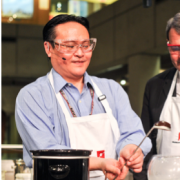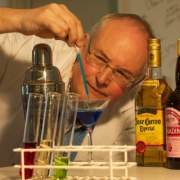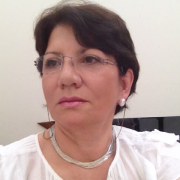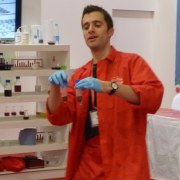Food: a gateway to science
Find this session's presentations here.
Just as there is a diversity of life forms that each eat a range of foods for sustenance, there are a number of museums and science centres that use food as a way of engaging visitors and students in science education. "Food for curious minds" was the theme of the 2015 Ecsite Annual Conference in Trento, Italy, where many great ideas, exhibits, programs, and hands-on activities were shared and presented. How many of these activities continue? How many new food-related activities have been inspired since then?
This workshop features many of the leaders and participants from the 2015 conference who have connections with food as a gateway to science, technology, engineering, and math (STEM). There will be hands-on activities, brief presentations (we want more doing than presenting),and discussion with the audience about some of the key elements and constraints that make food a topic to connect everyone's life with STEM education.
Facilitator
Director of Food STEM Initiative
Session speakers
Everyone knows that vitamins are important to supporting life. They also know that fruits, vegetables, and juices can be sources of vitamins, but which foods and juices have more vitamins. In this session participants will conduct an experiment to test the amount of vitamin C in different fruits, vegetables, and juices using a DCPIP test. Do fresh vegetables and juices and different amounts of vitamin C than canned/tinned, frozen, or dried food products? These activities are based on the work from the Life Science Centre which engages a broad audience and a large number of schools in programmes.
Kitchen activities can be used as a way to approach different scientific processes and concepts, both in teachers training, school activities or general public. During this hands-on session we’ll explore the science behind several food conservation techniques.
This activity is based on work from The Pavilion of Knowledge – Ciência Viva is an interactive museum of science and technology and an integrated part of the network of Ciência Viva Centres.
President of the Management Committee - Coordinator The Kitchen is a Laboratory
At Fábrica - Ciência Viva Science Centre from the University of Aveiro, the science of cooking is explored through activities at the installation, “Kitchen is a Laboratory.” Visitors learn through “hands on” cooking sessions about the composition of raw materials and their subsequent modifications that change their properties during cooking. This part of the session will present the functional properties of egg-white proteins, which make eggs one of the most used ingredients in a large diversity of prepared foods at home and in the commercial markets. Properties such as foamability and thermal coagulability and the manipulation of the foam stability are the basis of the preparation of delicious dishes that delight young and old.
Part of this session will look at a successful Public Engagement programme that has been going on this year, funded by The Wellcome Trust.
The Crunch is an exciting year of activities, experiences and discussions about our food, our health and our planet. The food we eat, our health, and the impact of our food on our planet are all interconnected, and through the various events, activities, kits and resources, The Crunch aims to get people thinking and talking about the food we all need to live.
This session will take some of the hands-on activities developed for the families’ programme of The Crunch and explore in greater detail the issues and messages involved. Planned activities so far include looking at Iron, as an essential component of a healthy diet, using a “Lucky Iron Fish” and looking at fibre, using an oat roller to roll your own oats.





